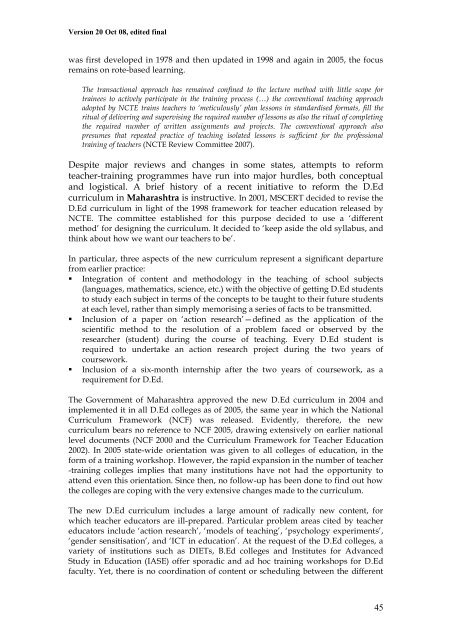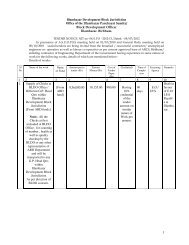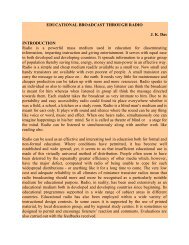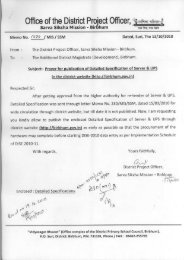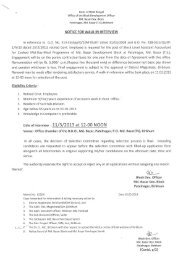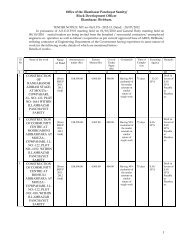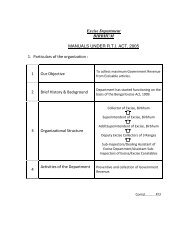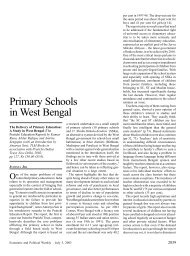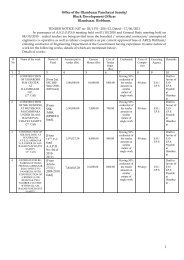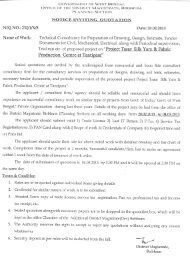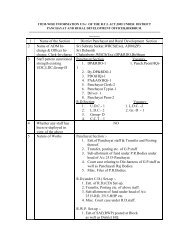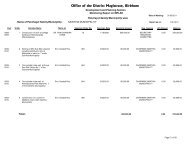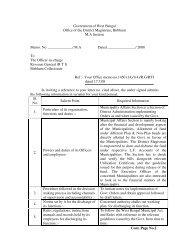primary school teachers the twists and turns of ... - ERU Consultants
primary school teachers the twists and turns of ... - ERU Consultants
primary school teachers the twists and turns of ... - ERU Consultants
Create successful ePaper yourself
Turn your PDF publications into a flip-book with our unique Google optimized e-Paper software.
Version 20 Oct 08, edited finalwas first developed in 1978 <strong>and</strong> <strong>the</strong>n updated in 1998 <strong>and</strong> again in 2005, <strong>the</strong> focusremains on rote-based learning.The transactional approach has remained confined to <strong>the</strong> lecture method with little scope fortrainees to actively participate in <strong>the</strong> training process (…) <strong>the</strong> conventional teaching approachadopted by NCTE trains <strong>teachers</strong> to ‘meticulously’ plan lessons in st<strong>and</strong>ardised formats, fill <strong>the</strong>ritual <strong>of</strong> delivering <strong>and</strong> supervising <strong>the</strong> required number <strong>of</strong> lessons as also <strong>the</strong> ritual <strong>of</strong> completing<strong>the</strong> required number <strong>of</strong> written assignments <strong>and</strong> projects. The conventional approach alsopresumes that repeated practice <strong>of</strong> teaching isolated lessons is sufficient for <strong>the</strong> pr<strong>of</strong>essionaltraining <strong>of</strong> <strong>teachers</strong> (NCTE Review Committee 2007).Despite major reviews <strong>and</strong> changes in some states, attempts to reformteacher-training programmes have run into major hurdles, both conceptual<strong>and</strong> logistical. A brief history <strong>of</strong> a recent initiative to reform <strong>the</strong> D.Edcurriculum in Maharashtra is instructive. In 2001, MSCERT decided to revise <strong>the</strong>D.Ed curriculum in light <strong>of</strong> <strong>the</strong> 1998 framework for teacher education released byNCTE. The committee established for this purpose decided to use a ‘differentmethod’ for designing <strong>the</strong> curriculum. It decided to ‘keep aside <strong>the</strong> old syllabus, <strong>and</strong>think about how we want our <strong>teachers</strong> to be’.In particular, three aspects <strong>of</strong> <strong>the</strong> new curriculum represent a significant departurefrom earlier practice: Integration <strong>of</strong> content <strong>and</strong> methodology in <strong>the</strong> teaching <strong>of</strong> <strong>school</strong> subjects(languages, ma<strong>the</strong>matics, science, etc.) with <strong>the</strong> objective <strong>of</strong> getting D.Ed studentsto study each subject in terms <strong>of</strong> <strong>the</strong> concepts to be taught to <strong>the</strong>ir future studentsat each level, ra<strong>the</strong>r than simply memorising a series <strong>of</strong> facts to be transmitted. Inclusion <strong>of</strong> a paper on ‘action research’—defined as <strong>the</strong> application <strong>of</strong> <strong>the</strong>scientific method to <strong>the</strong> resolution <strong>of</strong> a problem faced or observed by <strong>the</strong>researcher (student) during <strong>the</strong> course <strong>of</strong> teaching. Every D.Ed student isrequired to undertake an action research project during <strong>the</strong> two years <strong>of</strong>coursework. Inclusion <strong>of</strong> a six-month internship after <strong>the</strong> two years <strong>of</strong> coursework, as arequirement for D.Ed.The Government <strong>of</strong> Maharashtra approved <strong>the</strong> new D.Ed curriculum in 2004 <strong>and</strong>implemented it in all D.Ed colleges as <strong>of</strong> 2005, <strong>the</strong> same year in which <strong>the</strong> NationalCurriculum Framework (NCF) was released. Evidently, <strong>the</strong>refore, <strong>the</strong> newcurriculum bears no reference to NCF 2005, drawing extensively on earlier nationallevel documents (NCF 2000 <strong>and</strong> <strong>the</strong> Curriculum Framework for Teacher Education2002). In 2005 state-wide orientation was given to all colleges <strong>of</strong> education, in <strong>the</strong>form <strong>of</strong> a training workshop. However, <strong>the</strong> rapid expansion in <strong>the</strong> number <strong>of</strong> teacher-training colleges implies that many institutions have not had <strong>the</strong> opportunity toattend even this orientation. Since <strong>the</strong>n, no follow-up has been done to find out how<strong>the</strong> colleges are coping with <strong>the</strong> very extensive changes made to <strong>the</strong> curriculum.The new D.Ed curriculum includes a large amount <strong>of</strong> radically new content, forwhich teacher educators are ill-prepared. Particular problem areas cited by teachereducators include ‘action research’, ‘models <strong>of</strong> teaching’, ‘psychology experiments’,‘gender sensitisation’, <strong>and</strong> ‘ICT in education’. At <strong>the</strong> request <strong>of</strong> <strong>the</strong> D.Ed colleges, avariety <strong>of</strong> institutions such as DIETs, B.Ed colleges <strong>and</strong> Institutes for AdvancedStudy in Education (IASE) <strong>of</strong>fer sporadic <strong>and</strong> ad hoc training workshops for D.Edfaculty. Yet, <strong>the</strong>re is no coordination <strong>of</strong> content or scheduling between <strong>the</strong> different45


